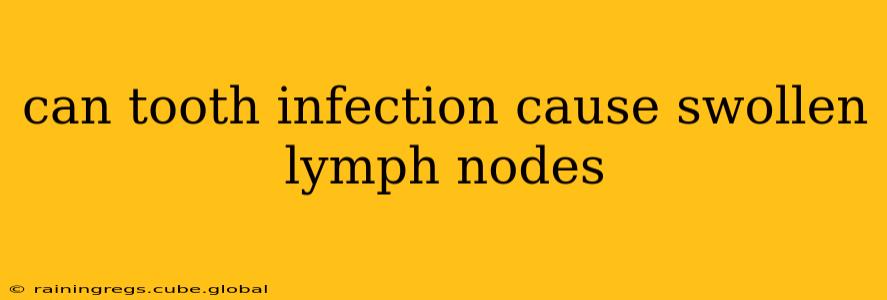Yes, a tooth infection can absolutely cause swollen lymph nodes. This is a common occurrence, and understanding why it happens can help alleviate anxiety and guide you towards appropriate treatment. Your lymph nodes are part of your body's immune system, acting as filters to trap bacteria, viruses, and other harmful substances. When an infection like a tooth abscess occurs, the body's immune response kicks into high gear, leading to inflammation and swelling in the nearby lymph nodes.
Where Will I Notice Swollen Lymph Nodes?
The location of the swollen lymph nodes will usually depend on the location of the infected tooth. For example, an infection in your lower jaw is more likely to cause swelling in the lymph nodes under your jaw or in your neck. Similarly, an upper jaw infection might lead to swelling in the lymph nodes closer to your cheekbones or under your ear.
How Do I Know If My Swollen Lymph Nodes Are Related to a Tooth Infection?
While swollen lymph nodes can be a symptom of many things, some clues point towards a dental cause:
- Location: As mentioned, the location of the swollen lymph nodes is often close to the site of the infection.
- Other Symptoms: Alongside swollen lymph nodes, you'll likely experience other symptoms of a tooth infection, such as severe toothache, sensitivity to hot or cold, pus formation, and swelling around the affected tooth.
- Timing: The swelling in your lymph nodes typically occurs shortly after the onset of the tooth infection.
What Should I Do If I Have Swollen Lymph Nodes and Suspect a Tooth Infection?
Don't delay seeking professional help. A dentist can properly diagnose the infection and provide the necessary treatment. Ignoring a tooth infection can lead to serious complications, including the spread of infection to other areas of the body.
Can a Tooth Infection Cause Swollen Lymph Nodes in Other Areas of the Body?
While it's less common, it's possible for a severe tooth infection to cause swollen lymph nodes further away from the infection site, particularly if the infection is extensive or untreated. This is because the infection may spread through the bloodstream, activating the immune response in more distant lymph nodes.
What Treatments Address Both Swollen Lymph Nodes and Tooth Infections?
Treatment for both the swollen lymph nodes and the tooth infection typically involves addressing the underlying dental problem. This usually involves:
- Root Canal: If the infection is in the pulp (the inner part of the tooth), a root canal may be necessary to remove the infected tissue.
- Extraction: In some cases, the tooth may need to be extracted.
- Antibiotics: Your dentist may prescribe antibiotics to fight the infection. This will address the infection directly and help reduce the swelling in the lymph nodes as the body fights off the bacteria.
- Pain Relief: Pain relievers may be prescribed to help manage discomfort.
When Should I See a Doctor or Dentist?
You should seek immediate dental care if you experience any signs or symptoms of a tooth infection, especially if accompanied by swollen lymph nodes. Early intervention is key to preventing serious complications.
Are Swollen Lymph Nodes Always a Sign of a Serious Problem?
Not always. Swollen lymph nodes are a common immune response to infection, and they often resolve once the underlying infection is treated. However, it's always best to have any swelling evaluated by a healthcare professional to rule out more serious causes.
This information is for general knowledge and does not constitute medical advice. Always consult with a dentist or doctor for diagnosis and treatment of any medical condition.
